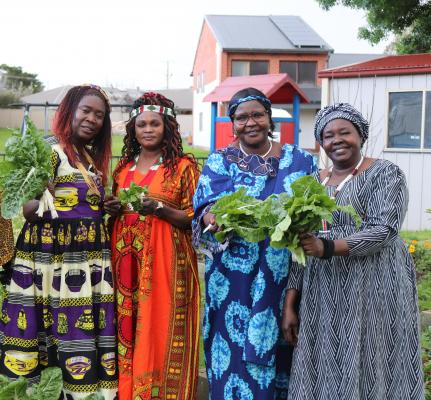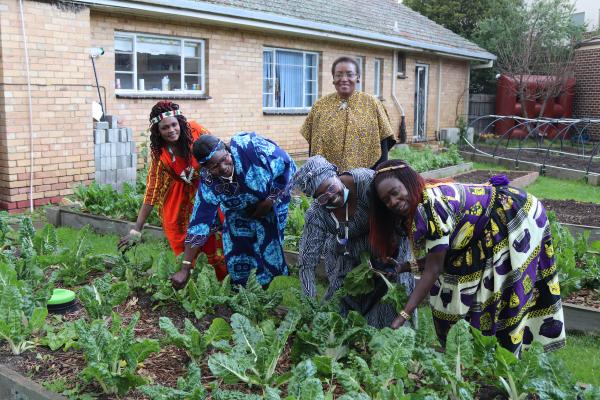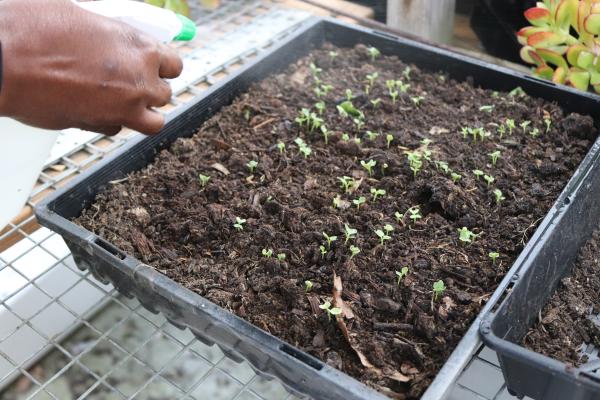By Danielle Kutchel
In 2020, Star News Group journalist DANIELLE KUTCHEL received funding from the Melbourne Press Club’s Michael Gordon Fellowship to explore mental health in asylum seeker and refugee communities. Below is part four of the story.
In an unassuming brick building in Springvale, a revolution is building.
It’s in the healthy crop of vegetables around the back; it’s in the scent of wholesome African home cooking, wafting through the window of the property; and it’s in the joyous laughter of its occupants as they go about their day’s work.
It’s the Afri-Aus Care UBUNTU Community Village, the home of Afri-Aus Care’s remarkable Empowering African Women UBUNTU in Practice program, which is transforming the lives of women who have come to Australia from South Sudan and other parts of the world.
The women, known as the ‘Mamas’, have been taken under the wing of Selba-Gondoza Luka, an award-winning local advocate for the South Sudanese community.
Though she herself was born in Malawi, Selba-Gondoza says her heart is in South Sudan.
She knows the struggles these refugees have faced in their settlement journey, and the toll it can take on mental health, because she too has been there.
“I don’t differ from them at all,” Selba-Gondoza explained.
When she arrived in Australia with her husband and young daughter, Selba-Gondoza faced severe depression and isolation.
After several years her husband left her and returned to Malawi – leaving Selba-Gondoza to raise their daughter alone.
Before he had left the country she had been hospitalised from her illness.
But she experienced an epiphany in hospital and knew that she could draw strength from others, if she could create a community here like that that she was used to back home.
She founded Afri-Aus Care to bridge the gap for new arrivals from Africa and other countries and create a village of support for parents and their children.
Soon, other women joined her, desperate for camaraderie and culturally-appropriate help. They told the same stories as Selba-Gondoza while supporting each other through their struggles.
“We know mental health is real,” Selba-Gondoza said.
Resettlement challenges, lack of jobs and employment, the language barrier, marriage breakdowns and domestic violence, substance misuse and seeing their children get into trouble with the law all exacerbate mental ill-health, she explained.
Using a combination of her lived experience and the principles of UBUNTU (a term often translated to mean ‘I am because we are’), she has created a transformational program that’s improving the mental health of Sudanese families through their mothers; a Positive Change Methodology that is working well with the cohort she supports.
The Mamas all tell a similar story, of arriving in Australia and feeling lonely, isolated and in many cases, anxious or depressed. Many are single mothers without support networks in Australia.
What they have now is the UBUNTU village, where every woman plays her part and where the Mamas feel safe and comfortable to come and tell their stories and get advice.
In return they are helping other women in the community. Their children are thriving in the collective family, receiving support and love from their ‘Mamas’ and ‘Aunties’ and giving their time to the community, rather than getting lost on the wrong side of the tracks.
When Mama Nyakuma arrived in Australia, she said she didn’t know where to go or what she would face.
Mama Nyakuma, a Nuer Women Community Leader in Victorian, said when their children faced challenges, it caused anxiety amongst the Mamas.
“That’s why we come together. We come to cry together, to share ideas and history, what’s happening and what we can do,” she said of the UBUNTU Mama’s group.
“When we share it, it clears my brain. I’m very happy with that and I think all the Mamas are happy.
“This is a solution for us and to our kids.”
Mama Hakima, another of the UBUNTU village’s participants, said she felt the same.
“It really is good, UBUNTU, because we are mothers and there are a lot of challenges…[but] when we come together, there are solutions.
“Earlier when we came together and couldn’t understand, it was not a good life. But with UBUNTU…if we share today, we are happy.”
Mama Veronica was “shocked” by the new society she encountered when she arrived in Australia.
She felt lonely, because her new society lived apart from relatives and friends rather than in a village-style as she would have back home.
The UBUNTU program gave her purpose and helped her connect with others again.
“I felt so happy because here we connect together and encourage one another. If you have a problem and you come here, you go back happy.”
She’s taken a lead role in planting the Afri-Aus Care UBUNTU Village garden and said it is “like medicine” for the Mamas.
“There’s no loneliness again. I’m happy,” Mama Veronica said.
Mama Rita said when she first arrived in Australia, life was not easy; she did not know how to find services like the hospital.
This became a life-threatening challenge when her daughter suffered a complicated medical problem.
She was fortunate to find support from a church group that helped her get to hospital, but she said being a single African mother in a new country is hard.
“But when we go and do things together, that’s called UBUNTU,” she said.
Over Covid, the Afri-Aus Care community has busily prepared packages of food using the crops from their garden, delivering them to those in isolation or doing it tough.
It’s a physical manifestation of the empathy this community has for anyone going through a hard time.
What their approach highlights is the importance of culturally-appropriate supports for mental health to support one another during tough times.
That’s the way they used to do it in Africa, the Mamas explained.
Across the south east, refugee and migrant communities are banding together to assist their own, sometimes with minimal support from external organisations and partners.
For the communities that have been established here for longer, like the Vietnamese community, members are old enough now to be taking up careers in the health space, offering tailored mental health support from a place of lived experience and understanding.
This is vital, according to Dr Judy Tang, a commissioner at the Victorian Multicultural Commission (VMC).
She believes there should be a greater effort put into increasing the capacity of multicultural communities to help themselves, by encouraging them to become mental health professionals so they can provide services to their own communities.
At the Bakhtar Cultural Association, youth coordinator Benazir Rasoli said this is beginning to happen as children of refugees and asylum seekers confront the stigmas around mental health, normalising discussion.
But more needs to be done, she said.
She agreed that there needs to be more “availability of people in the field” who are experts in both mental health and diverse communities.
She believes when people see a professional who can understand their story, their culture and their background, they will be more likely to disclose the trauma they’ve been through and seek help for it.
“We need more support in the community, more awareness, more stories being shared,” Benazir said.
The final report of the 2019 Royal Commission into Victoria’s Mental Health Commission noted the “great potential” of using lived experiences in mental health work.
It recommended a restructure of Victoria’s mental health system into one using a “community-based model of care”, that keeps people experiencing mental ill-health close to their communities.
It’s evident this would help refugee and asylum seeker communities, to keep them connected and supported as they get the help they need.
In its envisaged overhaul of the mental health system, the report recommended ensuring that Victorians could access appropriate mental health information regardless of their preferred first language.
Viv Nguyen AM, chairperson of the Victorian Multicultural Commission (VMC), said different multicultural communities could also work together to share their lived experiences to help each other through mental health challenges.
“I’d like to see my own [Vietnamese] community take a more proactive approach to support the Afghan community, given we know so well that lived experience,” she said.
“I’d also like to see greater collaboration between communities to rally behind them when they arrive and make sure we are a better society than, say, when the Vietnamese came 40 years ago.”
She’d like to see more events and activities run within communities to support wellbeing in a culturally safe and tailored way – to allow people to “talk it out” with people who “look like me”.
“The community does want to help and stay connected,” she said.
If you need to speak with someone, please contact:
– Victorian Foundation for Survivors of Torture (Foundation House) on 9389 8900 or foundationhouse.org.au
– Lifeline on 13 11 14 or lifeline.org.au









